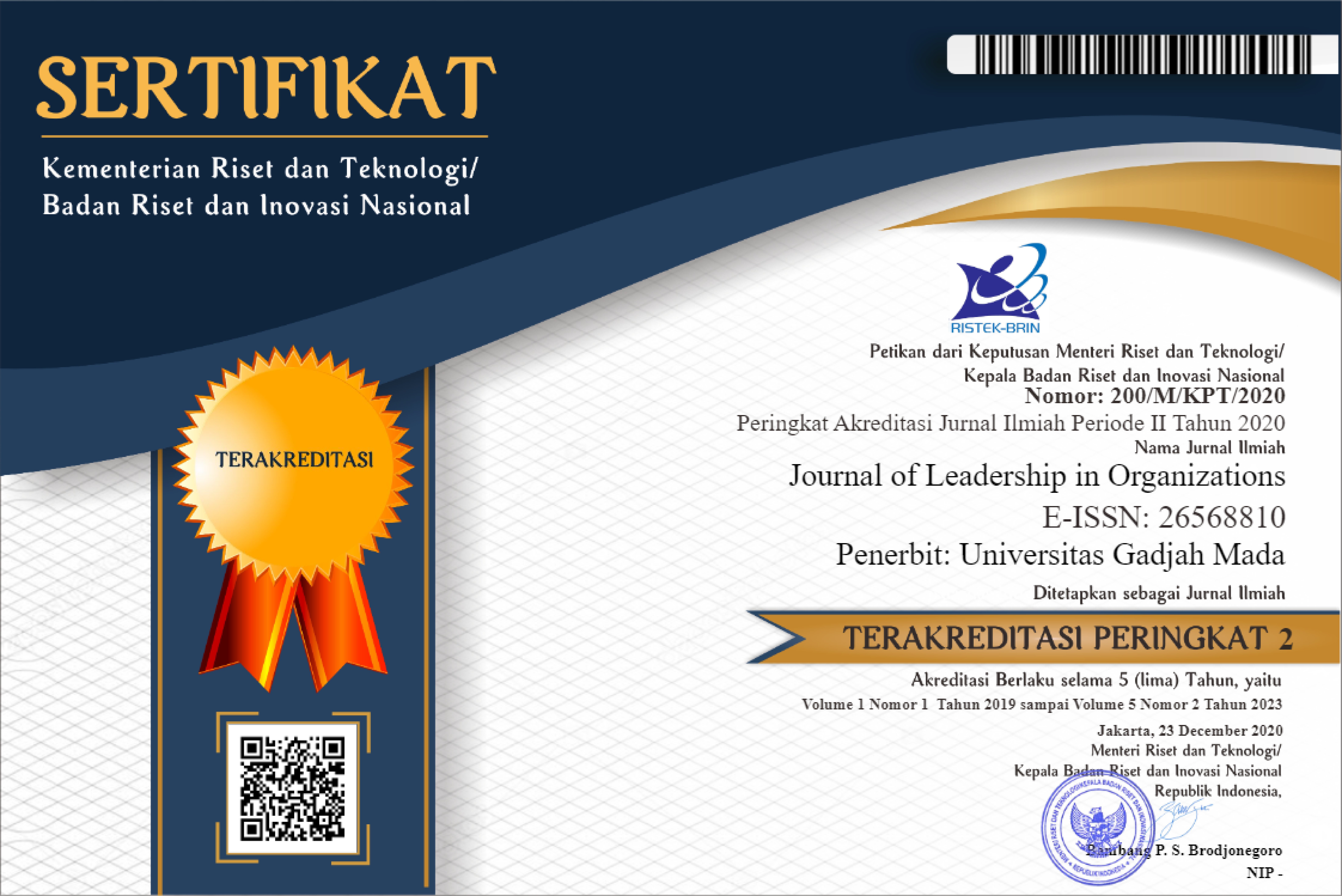The Influence of Paternalistic Leadership On Individual Performance
Anhar Januar Malik(1), C. Budi Santoso(2*)
(1) Management Retail, Institut Technology and Business Kalla
(2) Faculty of Economics and Business, Universitas Gadjah Mada, Indonesia
(*) Corresponding Author
Abstract
Keywords
Full Text:
PDFReferences
Atwater, L. E., Dionne, S. D., Avolio, B., Camobreco, J. F., & Lau, A. W. 1999. A longitudinal study of the leadership development process: Individual differences predicting leader effectiveness. Human Relations, Vol. 52. Pp. 1543–1562.
Aycan, Z. 2006. Paternalism: Towards conceptual refinement and operationalization. In Yang, K. S., Hwang, K. K., & Kim, U. (Eds.). Scientific Advances in Indigenous Psychologies: Empirical, Philosophical, and Cultural Contributions. London: Sage Ltd.
Aycan, Z., Kanungo, R. N., Mendonca M., Yu, K., Deller, J., Stahl, G., & Kurshid, A. 2000.
Impact of culture on human resource management practices: a ten-country comparison. Appl. Psychol. Int. Rev. Vol, 49. Pp. 192–220.
Baron, R. M. & Kenny, D. A. 1986. The moderator-mediator variable distinction in social psychological research: conceptual, strategic, and statistical consideration. Journal of Personality and Social Psychology. Vol. 51. Pp. 1173-1182.
Bendi, Akanksha, (2020). A meta-analytic review of paternalistic leadership. Applied Psychology: An International Review, Vol. 69(3), Pp.: 960-1008
Befort, N & Hattrup, K. 2003. Valuing task and contextual performance: experience, job roles, and ratings of the importance of job behavior. Applied H.R.M. Research. Vol. 8. Pp. 17-32.
Blau, P.M. 1964. Exchange and Power in Social Life. New York: Wiley.
Bligh, M. C. 2017. Leadership and Trust. In Marques, J. & Dhiman, S. (Eds.). Leadership today: practices for personal and professional performance. Switzerland: Springer International Publishing. Pp. 21-42.
Borman, W.C. & Motowidlo, S. J. 1993. Expanding the criterion domain to include elements of contextual performance. In N. Schmitt & W. C. Borman (Eds.). Personnel Selection in Organizations. San Fransisco. Jossey-Bass.
Borman, W. C. & Motowidlo, S. J. 1997. Task performance and contextual performance: The meaning for personnel selection research. Human Performance. Vol. 10. Pp. 99–109.
Burke, C. S., Sims, D. E., Lazzara, E. H., & Salas, E. 2007. Trust in leadership: A multi-level review and integration. The Leadership Quarterly. Vol. 18. Pp. 606-632.
Caesar, L. A. Y. 2016. Performance excellence by transformational leadership in developing collectivistic culture for Indonesian companies. Pertanika Journal of Social Sciences and Humanities. 24(S). Pp. 19-32.
Chan, S. C. H. & Mak, W. M. 2012. Benevolent leadership and follower performance: The mediating role of leader–member exchange (LMX). Asia Pacific Journal of Management. Vol. 29. Pp. 285-302.
Chan, S. C. H. 2014. Paternalistic Leadership and Employee Voice: Does Information Sharing Matter? Human Relations. Vol. 67. Pp. 667–693.
Chan, S. C. H. 2007. Paternalistic leadership styles and follower performance: examining mediating variables in a multi-level model. Proquest Dissertations and Theses. Hong Kong Polytechnic University. Hong Kong.
Chen, H. Y. & Kao, H. S. R. 2009. Chinese paternalistic leadership and non-Chinese subordinates' psychological health. The international Journal of Human Resource Management. Vol. 20. Pp. 2533-2546.
Chen, X. P., Eberly, M. B., Chiang, T., & Cheng, B. 2014. Affective trust in Chinese leaders: linking paternalistic leadership to employee performance. Journal of Management. Vol. 40. Pp. 796–819.
Chen, Y., Zhou, X., Klyver, K., (2019). Journal of Business Ethics, 159:587-603
Cheng, B. S., Boer, D., Chou, L. F. Huang, M. P., Yoneyama, S., Shim, D., Sun, J. M., Lin, T. T., Chou, W. J. & Tsai, C. Y. 2014. Paternalistic leadership in four East Asian societies: generalizability and cultural differences of the triad model. Journal of Cross-Cultural Psychology. Vol 45. Pp. 82–90.
Cheng, B. S., Chou, L. F., Wu, T. Y., Huang, M. P., & Farh, J. L. 2004. Paternalistic leadership and subordinate responses: establishing a leadership model in Chinese organizations. Asian Journal of Social Psychology. Vol. 7. Pp. 89–117.
Chou, H. J. 2012. Effects of Paternalistic leadership on job satisfaction–regulatory focus as the mediator. The International Journal of Organizational Innovation. Vol. 4. Pp. 62–85.
Chu, P. 2010. A study of the influence of paternalistic leadership and subordinate-supervisor relationship on working morale. Journal of Global Business Management. Vol. 6. Pp. 1-8.
Colquitt, J. A., Scott, B. A., & Lepine, J. A. 2007. Trust, trustworthiness, and trust propensity: a meta-analytic test of their unique relationships with risk taking and job performance. Journal of Applied Psychology. Vol. 92. Pp. 909-927.
Cooper, R. D., & Schindler, S. P. 2014. Business Research Methods 12th. New York:
McGrawHill.
Dirks, K.T., & Ferrin, D.L. 2002, Trust in leadership: meta-analytic findings and implications for research and practice. Journal of Applied Psychology. Vol. 87. Pp. 611–628.
Erben, G. S., & Guneser, A. B. 2008. The relationship between paternalistic leadership and organizational commitment: investigating the role of climate regarding ethics. Journal of Business Ethics. Vol. 82. Pp. 955-968.
Farh, J. L., & Cheng, B. S. 2000. A cultural analysis of paternalistic leadership in Chinese organizations. In J. T. Li., A. S. Tsui, & E. Weldon (Eds.), Management and Organizations in the Chinese context. London: Macmillan. Pp. 84-127.
Glick, P., & Fiske, S.T. 2001. Ambivalent stereotypes as legitimizing ideologies: Differentiating paternalistic and envious prejudice. In Jost, J. T., & Major, B. (Eds). The psychology of legitimacy: emerging perspective on ideology, justice, and intergroup relation. New York. Cambridge University Press. Pp.278-306.
Hofstede, G. (2017). The 6-D model of national culture. Retrieved 12 February 2022, from http://geerthofstede.com/culture-geert-hofstede-gertjan-hofstede/6d-model-of-national-culture/.
Huang, X., Iun, J., Liu, A., & Gong, Y. 2010. Does participative leadership enhance work performance by inducing empowerment and trust? The differential effects on managerial and non-managerial subordinates. Journal of Organizational Behavior. Vol.31. Pp. 122–143.
Irawanto, D. W., Ramsey, P. L., & Tweed, D. C. 2012. Exploring paternalistic leadership and its application to the Indonesian public sector. The International Journal of Leadership in Public Services. Vol. 8. Pp. 4-20.
Khan, S.N., Abdullah, S.M., Busari, A.H., Mubushar, M. and Khan, I.U., 2020. Reversing the lens: The role of followership dimensions in shaping transformational leadership behaviour; mediating role of trust in leadership. Leadership & Organization Development Journal.
Klaussner, S. 2012. Trust and Leadership: toward an interactionist perspective. Journal of Change Management, vol. 12, no.4, pp: 417-439
Launa, Wai Kwan, Lib, Z, and Okpara, J, 2020. An examination of three-way interactions of paternalistic leadership in China. Asia Pacific Business Review, 26 (1), pp.32-49
Liberman, L. 2014. The impact of a paternalistic style of management and delegation of authority on job satisfaction and organizational commitment in Chile and the US. Revista Innovar Journal. Vol. 24. Pp. 187–196.
Martinez, P. G. 2003. Paternalism as a positive form of leader-subordinate exchange: evidence from Mexico. Journal of Iberoamerican Academy of Management. Vol. 1. Pp. 227-242.
Martinez, P. G. 2005. Paternalism as a positive form of leadership in the Latin American context: Leader benevolence, decision-making control and human resource management practices. In M. Elvira & A. Davila (Eds.), Managing human resources in Latin America: An agenda for international leaders. Oxford. UK: Routledge.
Mayer, R. C., Davis, J. H., & Schoorman, F. D. 1995. An integrative model of organizational trust. Academy of Management Review. Vol. 20. Pp. 709-734.
Mcallister, D. J. 1995. Affect- and cognition-based trust as foundations for interpersonal cooperation in organizations. Academy Of Management Journal. Vol. 38. Pp. 24–59.
Motowidlo, S. J., Borman, W. C., & Schmit, M. J. 1997. A theory of individual differences in task and contextual performance. Human Performance. Vol. 10. Pp. 71-83.
Motowidlo, S. J., & Van Scooter, J. R. 1994. Evidence that task performanxce should be distinguished from contextual performance. Journal of Applied Psychology. Vol. 79. Pp. 475-480.
Motowidlo, S. J. 2000. Some basic issues related to contextual performance and organizational citizenship behavior in human resource management. Human Resource Management Review. Vol. 10. Pp. 115–126.
Motowidlo, S. J., & Borman, W. C. 2000. Contextual performance and organizational citizenship behavior in human resource management. Human Resource Management Review. Vol. 10. Pp. 1-2.
Niu, V. P., Wang, A. C., & Cheng, B. S. 2009. Effectiveness of a moral and benevolent leader: Probing the interactions of the dimensions of paternalistic leadership. Asian Journal of Social Psychology. Vol. 12. Pp. 32–39.
Pellegrini, E. K., & Scandura, T. A. 2006. Leader-member exchange (LMX), paternalism and delegation in the Turkish business culture: an empirical investigation. Journal of International Business Studies. Vol. 37. Pp. 264-279
Pellegrini, E. K., & Scandura, T. A. 2008. Paternalistic leadership: a review and agenda for future research. Journal of Management. Vol. 34. Pp. 566-593.
Pellegrini, E. K., Scandura, T. A., & Jayaraman, V. 2010. Cross-cultural generalizability of paternalistic leadership: an expansion of leader–member exchange theory. Group & Organization Management. Vol. 35. Pp. 391–420.
Schoorman, F. D., Mayer, R. C. & Davis, J. H. 2007. An integrative model of organizational trust: Past, Present, and Future. Academy of Management Review. Vol. 32. Pp. 344–354.
Sheer, Vivian C. 2012. In search of Chinese paternalistic leadership: conflicting evidence from samples of mainland China and Hongkong’s small family businesses. Management Communication Quarterly. Vol. 27. Pp. 34–60.
Sonnentag, S. 2002. Psychological Management of Individual Performance. John Wiley & Sons, Ltd. United Kingdom.
Sonnentag, S., Volmer, J., & Spychala, A. 2008. Job Performance. Sage Handbook of Organizational Behavior; Vol 1. Los Angeles, California. Sage.
Swierczek, F. W. 1991. Leadership and culture: comparing Asian managers. Leadership & Organization Development Journal. Vol. 12. Pp. 3-10.
Tan, J. X. 2015. The effects of benevolent leadership in ameliorating turnover problem in hotel industry. Review of Integrative Business & Economics Research. Vol. 4. Pp. 322–336.
Tang, C., & Naumann, S. E. 2015. Paternalistic leadership, subordinate perceived leader– member exchange and organizational citizenship behavior. Journal of Management & Organization. Vol. 21. Pp. 291-306.
Van Scotter, J. R. 2000. Relationships of task performance and contextual performance with turnover, job satisfaction, and affective commitment. Human Resource Management Review. Vol. 10. Pp. 79–95.
Van Scotter, J. R., & Motowidlo, S. J. 1996. Interpersonal facilitation and job dedication as separate facets of contextual performance. Journal of Applied Psychology. Vol. 81. Pp. 525.
Wang, A. C., & Cheng, B. S. 2010. When does benevolent leadership lead to creativity? The moderating role of creative role identity and job autonomy. Journal of Organizational Behavior. Vol. 31. Pp. 106–121.
Wang, A.C., Tsai, C.Y., Dionne, S.D., Yammarino, F.J., Spain, S.M., Ling, H.C., Huang, M.P., Chou, L.F. and Cheng, B.S., 2018. Benevolence-dominant, authoritarianism-dominant, and classical paternalistic leadership: Testing their relationships with subordinate performance. The Leadership Quarterly, 29(6), pp.686-697.
Wang, H., Law, K. S., Hackett, R. D., Wang, D., & Chen, Z. X. 2005. Leader member exchange as a mediator of the relationship between transformational leadership and followers' performance and organizational citizenship behavior. Academy Of Management Journal. Vol. 48. Pp. 420-432.
Wagstaff, M. F., Collela, A., Trian, M. C., Smith, A. N., & Watkins, M. B. 2015. Subordinates’ perceptions of supervisor paternalism: a scale development. Journal of Managerial Psychology. Vol. 30. Pp. 659-674.
Wu, M., Huang, X., & Chan, S. C. H. 2012. The influencing mechanisms of paternalistic leadership in mainland China. Asia Pacific Business Review. Vol. 18. Pp. 631–648.
Wu, Y. C., & Tsui, P. J. 2012. Multidimensional relationships between paternalistic leadership and perceptions of organizational ethical climates. Psychological Reports: Human Resources & Marketing. Vol. 111. Pp. 509–527.
Zhang, Y., Huai, M. Y., & Xie, Y. H. 2015. Paternalistic leadership and employee voice in China: A dual process model. The Leadership Quarterly. Vol. 26. Pp. 25–36.
Article Metrics
Refbacks
- There are currently no refbacks.
Copyright (c) 2022 Journal of Leadership in Organizations

This work is licensed under a Creative Commons Attribution-ShareAlike 4.0 International License.
| Journal of Leadership in Organizations |
| Journal of Leadership in Organizations (JLO), with registered number ISSN 2656-8829 (Print) and ISSN 2656-8810 (Online), is published by the Center for Leadership Studies, Department of Management, Faculty of Economics and Business, Universitas Gadjah Mada. The content of this website is licensed under a Creative Commons Attribution-ShareAlike 4.0 International License |
| © 2019 Journal of Leadership in Organizations | |





_logo2.png)


.png)




